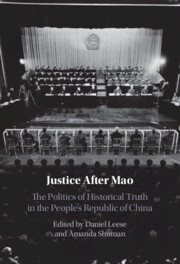Book contents
- Justice After Mao
- Justice After Mao
- Copyright page
- Contents
- Figures
- Tables
- Contributors
- Acknowledgments
- Introduction
- Part I Property
- 1 Between Revolution and Law
- 2 What Right to Property When Rebellion Is Justified?
- 3 The Pursuit of Transitional Justice from Below
- Part II The Mechanics of Rehabilitation
- Part III The Politics of Truth
- Part IV Memory
- Afterword
- Appendix
- Bibliography
- Index
2 - What Right to Property When Rebellion Is Justified?
Revolution and Restitution in Shanghai
from Part I - Property
Published online by Cambridge University Press: 31 August 2023
- Justice After Mao
- Justice After Mao
- Copyright page
- Contents
- Figures
- Tables
- Contributors
- Acknowledgments
- Introduction
- Part I Property
- 1 Between Revolution and Law
- 2 What Right to Property When Rebellion Is Justified?
- 3 The Pursuit of Transitional Justice from Below
- Part II The Mechanics of Rehabilitation
- Part III The Politics of Truth
- Part IV Memory
- Afterword
- Appendix
- Bibliography
- Index
Summary
The return of personal belongings has the potential to anchor the lofty rhetoric of historical justice in people’s everyday material realities. However, in the case of the Chinese government’s efforts to return belongings seized by Red Guards in the house raids of 1966 it is necessary to separate the history of restitution from the politics of history to understand how one relates to the other. This chapter analyzes the structure put in place by the Shanghai Revolutionary Committee, on orders of the Chinese Communist Party, to begin returning possessions less than a year after the house raids. By reassembling documents that have survived from this process, it shows that the scope of early restitution, which occurred when the Chinese Communist Party was still affirming the actions of the Red Guards, was far more important than has previously been assumed. In fact, the policy of restitution went through not one but two moments of transition: the first when the Cultural Revolution entered its corrective phase and the second when the post-Mao leadership declared the house raids illegal. Each moment saw an expansion of restitution informed by a shift in how the Chinese state defined entitlement and membership in the political community. It is important to avoid interpreting early restitution through the explanatory framework that emerged after Mao’s death not only because it distorts the facts and motivations of the earlier process, but also because the separation of the two allows for a better understanding of both, and in particular of how restitution became, in the end, concrete proof of what it meant to come to terms with the Cultural Revolution.
- Type
- Chapter
- Information
- Justice After MaoThe Politics of Historical Truth in the People's Republic of China, pp. 45 - 72Publisher: Cambridge University PressPrint publication year: 2023

